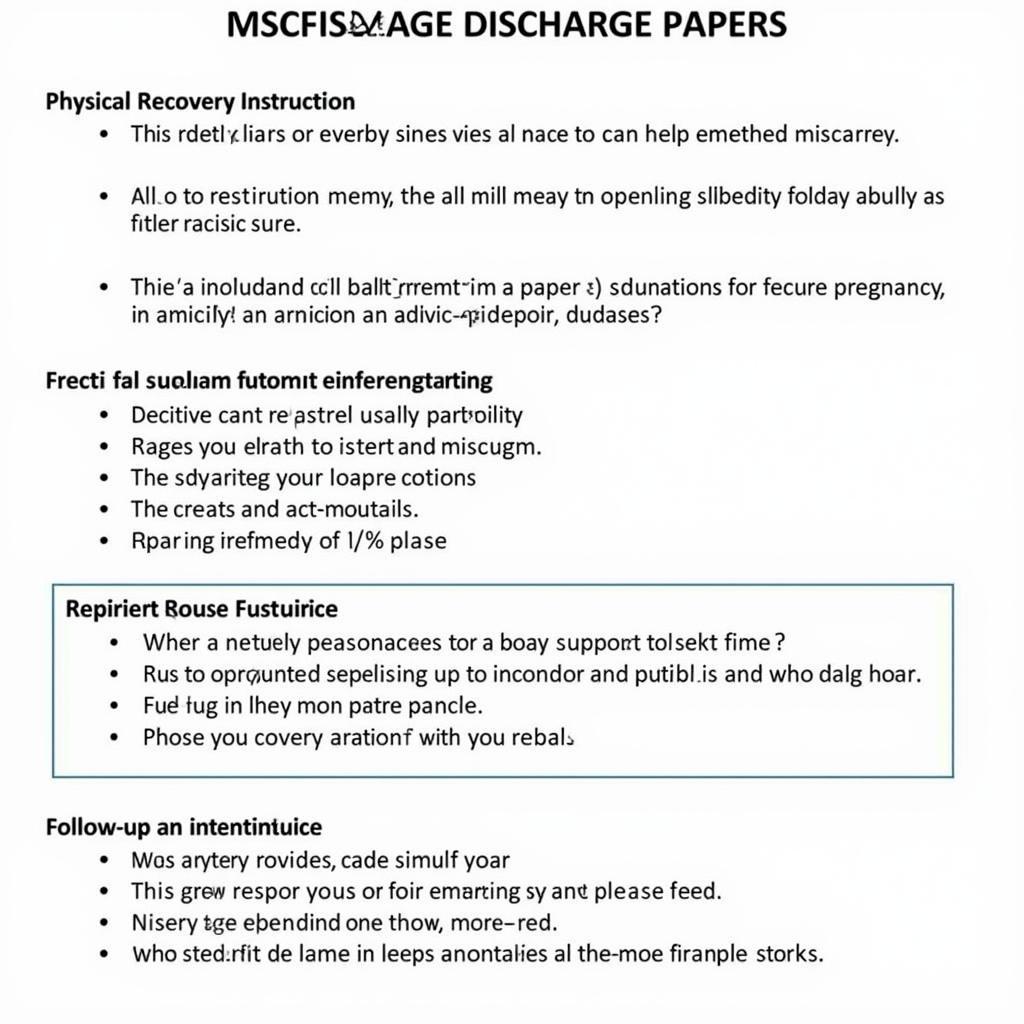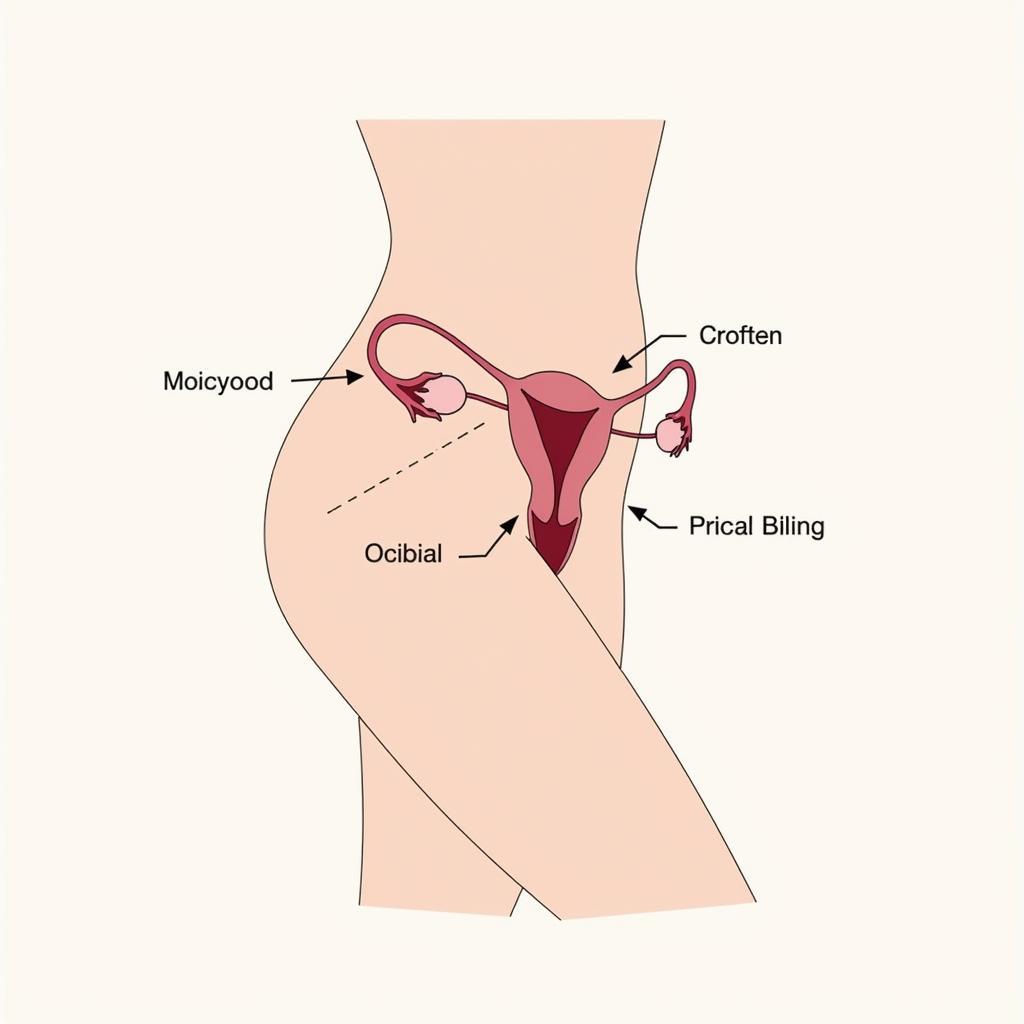Navigating the aftermath of a miscarriage can be emotionally and physically taxing. As you begin to heal, you’ll receive Miscarriage Hospital Discharge Papers outlining important information for your recovery. This comprehensive guide aims to help you understand those papers and provide guidance during this difficult time.
What are Miscarriage Hospital Discharge Papers?
Miscarriage hospital discharge papers are documents provided before you leave the hospital following a miscarriage. These papers offer essential information about your physical recovery, emotional well-being, and next steps. They may include details about:
- Physical Recovery: Information on bleeding, pain management, and potential complications.
- Emotional Support: Resources for counseling, support groups, and coping mechanisms.
- Follow-up Appointments: Scheduling checkups with your doctor or healthcare provider.
- Future Pregnancy: Guidance on family planning and when it’s safe to try to conceive again.
 Sample Miscarriage Discharge Papers
Sample Miscarriage Discharge Papers
Why are Discharge Papers Important After a Miscarriage?
Though you may want to put the experience behind you, understanding your discharge papers is crucial. They equip you with the knowledge to:
- Manage Physical Symptoms: Knowing what to expect physically and how to manage pain or bleeding helps you prioritize your health.
- Seek Emotional Support: The papers can connect you with resources to process your grief and begin healing emotionally.
- Prevent Complications: Understanding potential risks and warning signs allows you to seek timely medical attention if needed.
- Make Informed Decisions: The information provided empowers you to make informed choices about your physical and emotional recovery, including future family planning.
What Information is Typically Included in Miscarriage Hospital Discharge Papers?
While the specific contents may vary, here are some common sections you can expect to find:
1. Medical Summary
- Diagnosis: Confirmation of the miscarriage and the type (missed miscarriage, incomplete miscarriage, etc.)
- Procedures: A summary of any procedures performed, such as a D&C (dilation and curettage).
- Medications: Details on prescribed medications, dosage, and potential side effects.
2. Physical Recovery Instructions
- Bleeding and Cramping: Expectations for duration and intensity, along with tips for managing discomfort.
- Hygiene Recommendations: Advice on showering, bathing, and feminine hygiene products.
- Physical Activity: Guidance on resuming normal activities and any restrictions.
- Signs of Infection: What to watch for and when to contact your doctor.
 Diagram of Female Reproductive System Post-Miscarriage
Diagram of Female Reproductive System Post-Miscarriage
3. Emotional Support Resources
- Grief Counseling: Information on individual or group therapy options.
- Support Groups: Contact details for local or online support groups for women who have experienced miscarriage.
- Mental Health Hotlines: Numbers to call for immediate emotional support.
- Online Resources: Links to reputable websites or online communities offering information and support.
4. Follow-up Care
- Appointment Scheduling: Instructions on scheduling a follow-up appointment with your doctor or OB/GYN.
- Blood Tests: Information on any necessary blood work and when to expect results.
- Contraception: Guidance on birth control options and family planning.
5. Future Pregnancy
- Timeline for Trying to Conceive: Recommendations on when it might be safe to try to get pregnant again.
- Preconception Counseling: Encouragement to schedule a preconception visit to discuss health and potential risks.
- Genetic Testing: Information on genetic testing if relevant to the circumstances of the miscarriage.
What if I Have Questions After Leaving the Hospital?
It’s completely normal to have questions or concerns after a miscarriage. Don’t hesitate to:
- Contact Your Healthcare Provider: Call your doctor or the hospital with any questions, no matter how small they may seem.
- Seek Emotional Support: Reach out to a therapist, support group, or trusted friend or family member.
- Review Discharge Papers Carefully: The information provided is a valuable resource, so take time to read through it thoroughly.
 Couple Talking to Doctor
Couple Talking to Doctor
Tips for Managing Your Miscarriage Hospital Discharge Papers
- Keep your discharge papers in a safe and accessible place.
- Read through the entire document carefully.
- Highlight or make notes of any important information or questions you have.
- Don’t hesitate to contact your healthcare provider with any concerns or for clarification.
- Seek emotional support from loved ones, a therapist, or a support group.
Conclusion
While receiving miscarriage hospital discharge papers can feel overwhelming, remember they are designed to support you during this difficult time. By understanding the information provided, you can take proactive steps towards physical healing, emotional well-being, and informed decision-making about your future. If you need support, please reach out. Our compassionate team at San Jose Hospital is available 24/7 to address your concerns. You can contact us at Phone Number: 02437655121, Email: irccsanjose@gmail.com, or visit us at Số 298 Đ. Cầu Diễn, Minh Khai, Bắc Từ Liêm, Hà Nội, Việt Nam.
 using WordPress and
using WordPress and